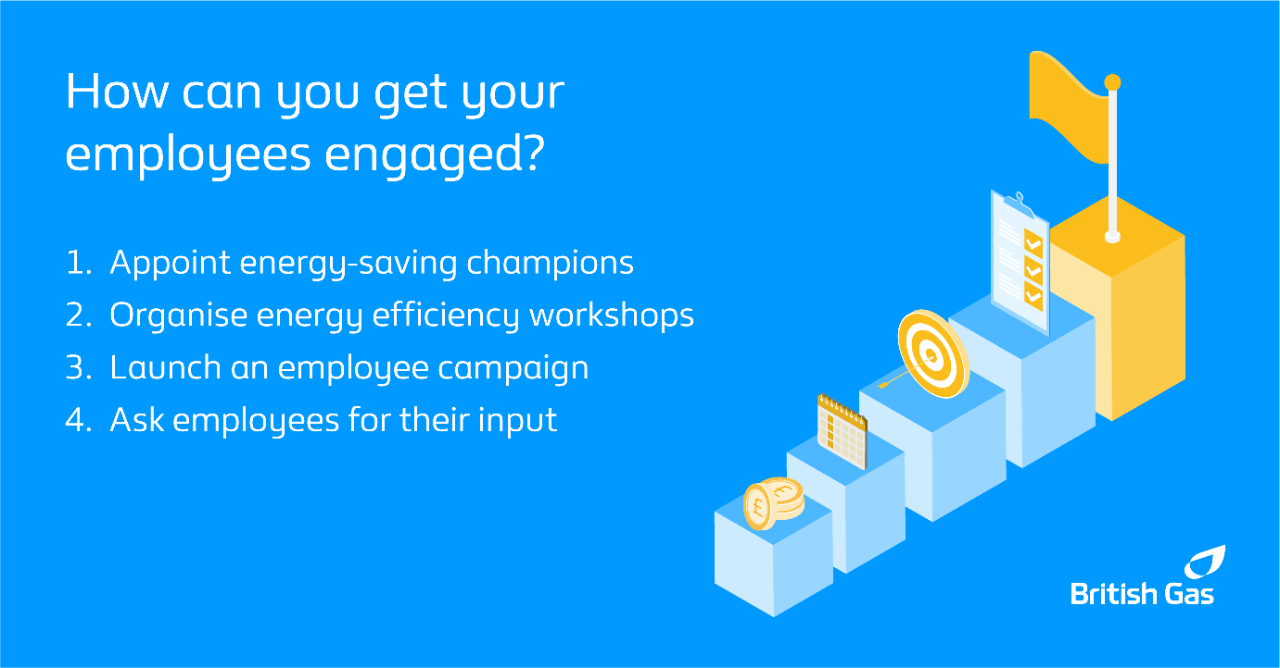6 ways to create an energy-saving culture
In business, energy-saving will be most successful when your employees are on board. Follow these tips to help create an energy-efficient culture at your organisation.
Working towards net zero can be a complicated journey. You’ll need to balance cutting costs with cutting carbon to create a sustainable action plan. At the centre of this is understanding how and where you use energy, so you can find ways to make savings – creating environmental and financial benefits.
To change how you use energy, you’ll need to transform the culture of your organisation to focus on energy efficiency. The involvement of your colleagues will be at the heart of this change. There are many practical ways to create an energy-saving culture, and so we’ve compiled some tips to get you started.
1. Involve all your employees
Energy-saving changes often happen because employees ask for them. So, you could get the conversation started by promoting best practice and expectations on how and when energy should be used. On top of this, creating awareness of how energy is already being used at your premises could help to highlight potential savings.
- Ask employees for their input – you'll need to make behavioural and usage changes to get carbon-saving ideas flowing
- Organise energy efficiency workshops and training to upskill employees on reducing costs and carbon
- Launch an employee-focused energy efficiency campaign, like the "Healthier Planet, Healthier People" campaign created by NHS England
- Share internal data on energy usage to bring everyone on board
1. Appoint ‘Energy Champions’ to lead your organisation’s energy agenda
By appointing employees as ‘energy champions’, you can involve your colleagues at every step of your journey to net zero. Whether at site level or company-wide, your Energy Champions could support you on changes and take responsibility of your energy saving plans through:
- Driving change, and maintaining agreed actions in the long term
- Reporting on energy waste day-to-day, and auditing changes being implemented
- Orchestrating maintenance of equipment and appliances, to ensure they’re using energy as efficiently as possible
- Circulating regular communications on energy-saving changes, results and best practice
- Setting communal goals and rewarding energy-saving efforts
- Delivering training and upskilling on energy efficiency
2. Redesign processes and policies
Energy efficiency doesn’t stop with getting your employees involved. To embed energy-saving measures into your organisation’s future, you’ll need to consider how your policies and processes support your net zero strategy:
- Audit your day-to-day activities like vehicle usage and purchased electricity to ensure you’re saving as much carbon as possible – and reducing your Scope 1 and 2 emissions
- Review your procurement policies to ensure you’re working with sustainable suppliers, helping you to lower your Scope 3 emissions
- Consider whether your financial modelling could support investment in green technology, such as solar panels or heat pumps
3. Bring leaders on board
Are senior executives engaged with your energy-saving agenda? To successfully transform your company culture, your leaders will need to be invested in making changes. You could start to bring your executives on board by:
- Involve senior leaders in sustainability decisions, such as investing in green technology
- Bring senior leaders into internal communications to add credibility to your initiative
- Drive action from the top down by ensuring your senior leaders are participating in energy-saving initiatives
4. Maintain a culture of innovation
Making changes to your company culture goes hand-in-hand with innovation, and improving your energy efficiency is no exception. In our survey, 38% of organisations in UK and Ireland said they didn’t know which tech to invest in.[1] But there are several ways that you could solve this:
- Reach out for support from your British Gas point of contact
- Review your energy usage regularly by accessing your consumption data or request a smart meter (if you don’t already have one) to get started
5. Measure the success of your initiatives
Your energy-saving initiatives are the right place to start – but you’ll need to track them long term to ensure they’re having the right impact. You and your Energy Champions could explore this in a number of ways:
- Work with your Energy Champions to schedule regular audits of your energy usage and potential savings
- Request your business energy usage report from British Gas to analyse the impact of your initiatives over time
- Access your weekly/monthly consumption data to track how your initiatives are impacting your day-to-day cost and carbon savings
- Make energy saving a business priority with embedded energy monitoring policies across your BAU activities
Find out more about how your large business can save on its energy use.
[1] Your business guide to pursuing net zero, UK & Ireland bar: page 7.
Why track your business energy?
23rd February 2023
In "Energy News"
Ofgem's Targeted Charging Review explained
17th March 2022
In "Energy News"
Business energy insights – what's the future?
29th January 2021
In "Energy News"




